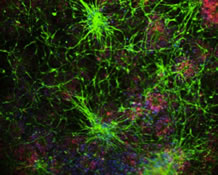Columbia University
Irving Medical Center
Neurological Institute
710 West 168th Street, 3rd floor
(212) 305-1818
About Us
Taub Faculty
Research Summary:
Excitatory synapses in the central nervous system must simultaneously be plastic, in order to change their response properties over time, and stable, in order to persist for weeks to months, or even throughout an organism's lifetime. Defects in either property can lead to neurodevelopmental or neurodegenerative disorders, severely compromising cognition and quality of life. My laboratory studies the molecular mechanisms underlying these two critical yet seemingly contradictory synaptic properties. Our focus is on protein ubiquitination, a post-translational modification that targets proteins for degradation and has less-understood roles in coordinating their trafficking and binding interactions. At synapses, "regulated" ubiquitination is implicated in synapse formation/stabilization, neurotransmitter release, and plasticity mechanisms, while "dysregulated" ubiquitination is linked to synapse destabilization/loss and the etiology of several devastating neurodegenerative diseases. Accordingly, our two major areas of investigation are: 1) how ubiquitination regulates normal synaptic function, focusing on its roles in neurotransmitter release and receptor trafficking, and 2) how imbalances in synaptic ubiquitination disrupt protein homeostasis and lead to neurodegeneration. To address these questions, we perform gain and loss-of-function studies in primary neuronal cultures and hippocampal slices, using a sophisticated lentiviral delivery system, quantitative live-cell imaging, gene expression profiling, and biochemical analyses.
Education and Training:
PhD: University of California, San Francisco, 2001


